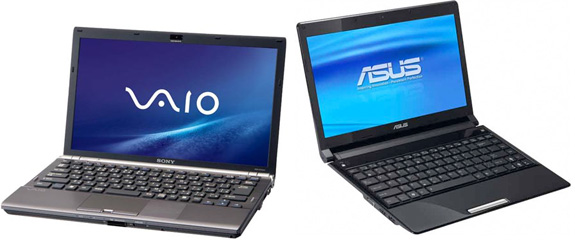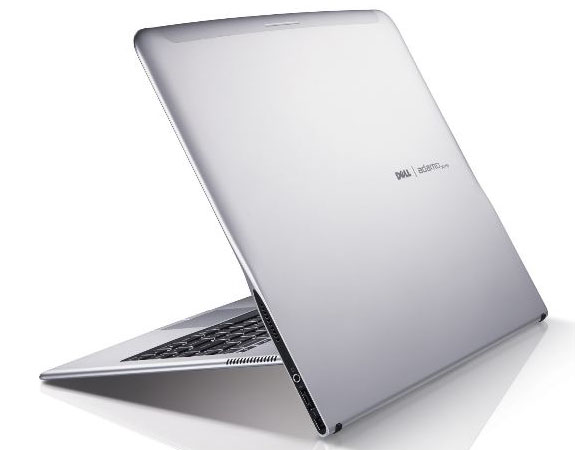The World’s Thinnest Consumer Netbook
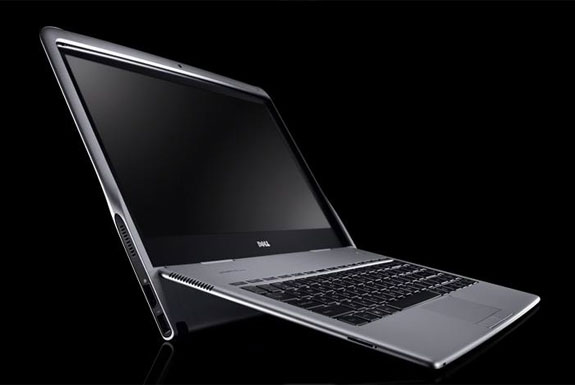
SPOT MORE COOL STUFF:
Laptops | Travel Gadgets
| All Tech & Gadget Reviews
Move over Apple MacBook Air. The thinnest laptop on the consumer market is now made by Dell: The Adamo XPS.
Measuring in at a mere 10mm (0.4 inches) thick, and sporting a bright screen and slick form factor, the XPS just looks cool. But is it a novelty item or a netbook worth buying?
Spot Cool Stuff’s verdict:
The Design
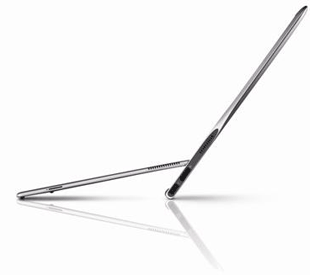 The most visually distinguishing feature of the Dell Adamo XPS is the way it unfolds. One doesn’t manually open it. One drags a finger across the touch sensor on the front of the machine and this laptop electronically unfolds. It is a cool feature—initially at least— but comes with two big drawbacks. First, it places an avoidable extra strain on the laptop’s battery that already seems overburdened (see below). Second, if the Adamo XPS runs out of power there’s no manual way to close or open it. We also have concerns over the long term durability of the electronic closing/opening mechanism.
The most visually distinguishing feature of the Dell Adamo XPS is the way it unfolds. One doesn’t manually open it. One drags a finger across the touch sensor on the front of the machine and this laptop electronically unfolds. It is a cool feature—initially at least— but comes with two big drawbacks. First, it places an avoidable extra strain on the laptop’s battery that already seems overburdened (see below). Second, if the Adamo XPS runs out of power there’s no manual way to close or open it. We also have concerns over the long term durability of the electronic closing/opening mechanism.
Looks wise, the Adamo XPS really turns heads sitting out on a desk. When open the screen automatically tips back 25 degrees and the keyboard tilts to a comfortable 13 degree typing angle. The keyboard is so thin that from across a room it can appear as if XPS user is typing on air. Yet despite this thinness the Adamo XPS’s keys are very responsive and “punchable.” The screen, 1366 by 768 pixels, is very bright and crisp and has a wide viewing angle.
Like virtually every other ultra-thin netbook, the Adamo XPS does not dissipate heat well. The XPS’s “tilted” design greatly helps alleviate this by providing constant airflow underneath the keyboard.
Overall Spot Cool Stuff is a fan of the Adamo XPS’s design and like how stands out from other laptops.
The Function
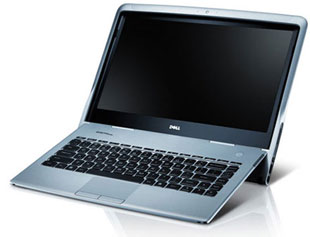 The good news first: The Dell Adamo XPS boots up in a quick 30 seconds (about half the time of most other laptops). The included 128GB SSD drive is quiet and zippy. The built-in 1.3MP webcam performs admirably; that, together with the 1.4 Ghz Intel Core Duo CPU makes the Adamo XPS a very Skype-friendly computer. We’re also impressed with the software extras Dell provides, including Phoenix FailSafe theft protection, Sensible Vision Fast Access facial recognition, Dell QuickSet, a 15-month trial of McAfee Security Center and Skyhook local info software.
The good news first: The Dell Adamo XPS boots up in a quick 30 seconds (about half the time of most other laptops). The included 128GB SSD drive is quiet and zippy. The built-in 1.3MP webcam performs admirably; that, together with the 1.4 Ghz Intel Core Duo CPU makes the Adamo XPS a very Skype-friendly computer. We’re also impressed with the software extras Dell provides, including Phoenix FailSafe theft protection, Sensible Vision Fast Access facial recognition, Dell QuickSet, a 15-month trial of McAfee Security Center and Skyhook local info software.
Our biggest disappointment with the Dell Adamo XPS is the poor battery life—Dell officially rates it at 5 hours 17 minutes but during our real-world use it came out to more around 3 hours 20 minutes. And that doesn’t include power taken up opening and closing the computer.
Another downer: The graphics displayed via the Adamo’s integrated Intel GMA 4500MHD GPU is rather sluggish. The speed is more than adequate for emailing, word processing, web surfing, photo editing, tweeting, Facebook-ing, YouTube-ing and other common computer uses. But try to run World of Warcraft and it becomes clear that this is not a gaming computer.
Some ways the Dell Adamo XPS stacks up to other ultra-thin options, the Sony VAIO Z and the ASUS UL30A:
| Features: | Dell Adamo XPS | Sony VAIO Z | ASUS UL30A-X5 | ||||
| Approx price (US$) | $1,700 | $2,350 | $650 | ||||
| Thin-ness | 0.4″ (10mm) | 1″ (25mm) | 1″ (25mm) | ||||
| Weight with battery | 3.20 pounds (1.45 kg) | 3.04 pounds (1.38kg) | 3.74 pounds (1.70 kg) | ||||
| Screen | 13.4″ | 13.1″ | 13.3″ | ||||
| Battery Life (from manufacturer) | 5 hrs 17 mins | 6 hrs 30 mins | 12 hrs 0 mins | ||||
| Standard OS | Windows 7 Home Premium | Windows 7 Professional | Windows 7 Home Premium | ||||
| Standard hard drive | 128GB SSD | 192GB SSD | 500GB SATA Hard Drive (5400 rpm) | ||||
| Standard CPU | 1.4 GHz Intel Core 2 Duo | 2.53GHz (3.06GHz with “turbo boost”) Intel i5 | 1.3 GHz Intel Core 2 Duo | ||||
| Web-cam | 1.3MP | 0.3MP | 0.3MP | ||||
| Boot time | 31 secs | 62 secs | 38 secs | ||||
| GPS | No | Yes | No | ||||
| Memory (standard / max) | 4GB / 4G | 4GB / 8GB | 4GB / 4GB | ||||
| Features: | Dell Adamo XPS | Sony VAIO Z | ASUS UL30A-X5 |
Our Verdict
If you are shopping for a powerful computer wrapped in a small, durable package we’d suggest a Sony VAIO Z Series laptop over an Adamo XPS. Yes, it is more expensive but it is also appreciably faster, especially when running video (thanks to 1GB of dedicated video RAM) or graphics intensive applications. We also have more long term faith in the VAIO Z’s rock solid build quality.
If you seek a high value laptop with specs similar to the XPS, then the ASUS UL30A-X5 is the better choice. It isn’t quite as fast. It isn’t quiet as light. It’s “old fashion” hard drive is more sluggish and less durable. But it is also one-third the price. And has significantly more battery power.
The Dell Adamo XPS occupies a middle ground between those two. It’s not that powerful, but powerful enough. Not that cheap, but a good enough value. For extreme travelers or those placing a premium on netbook size, the Adamo XPS is a logical choice. For others, choosing a XPS requires some degree of abandoning practicality. After all, there’s something cool about having the thinnest laptop out all. And the Dell Adamo XPS just looks great.
If you do buy a Dell Adamo XPS . . . we strongly suggest picking up a more powerful 9-cell battery, the more mAh the better.
LEARN MORE & BUY | FOLLOW US ON TWITTER |
Related posts:
$350 Lightweight Laptop Showdown: Acer vs Asus
The 8 Best—and 8 Worst—Features of the Apple iPad
A Review of the The Viliv S5 Net-Tablet PC
The Best Digital Cameras for Travel












